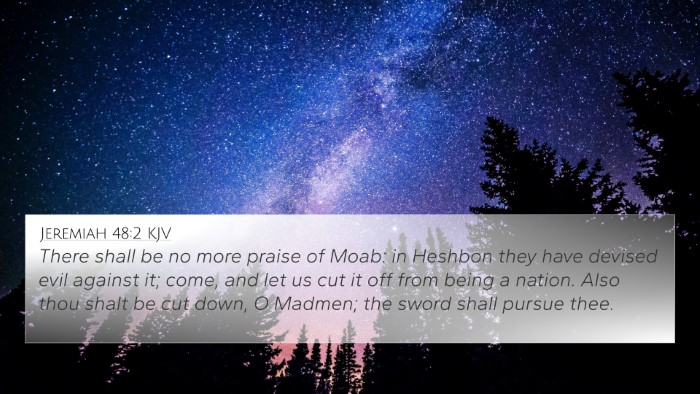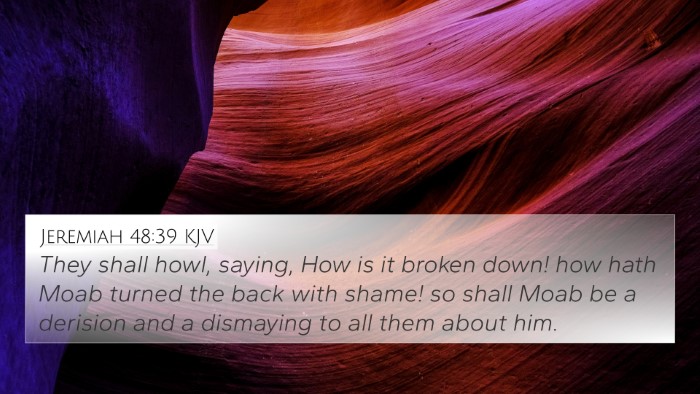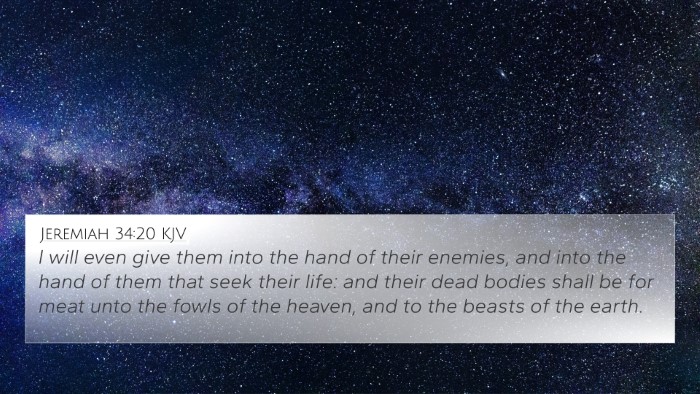Understanding Jeremiah 49:37
Jeremiah 49:37 states: "For I will cause Elam to be dismayed before their enemies, and before them that seek their life: and I will bring evil upon them, even my fierce anger, saith the Lord; and I will send the sword after them, till I have consumed them:" This verse is significant in the context of God's judgment against nations, particularly Elam.
Commentary Insights
Various public domain commentaries provide helpful insights into the meanings of this verse:
- Matthew Henry: Henry emphasizes the unconditionality of God’s judgment. He notes that Elam's dismay represents a complete and utter defeat, highlighting God’s sovereignty over nations and His ability to bring nations low.
- Albert Barnes: Barnes interprets this passage as a prophetic declaration of divine wrath. He connects the dismay to the fear that will seize Elam as they face their adversaries, portraying a vivid image of impending destruction due to their disobedience.
- Adam Clarke: Clarke adds a historical perspective, noting how the downfall of Elam was intertwined with its alliances and conflicts with surrounding nations, showing the consequences of their societal sins.
Thematic Connections
This verse serves as a critical link in the broader narrative of prophetic literature, which often warns nations of impending doom for their actions. The themes of judgment, fear, and retribution are prevalent throughout Scripture. The connections made in this verse align with several other Biblical texts:
- Isaiah 21:2 - Speaks of the fall of Elam in a prophetic context.
- Jeremiah 25:29 - God’s threat to bring judgment upon all, including nations like Elam.
- Ezekiel 32:24 - Mentions the judgment of the nations, linking to Elam's fate.
- Amos 1:2 - Discusses other nations facing similar wrath, establishing a pattern of divine judgment.
- Isaiah 34:2 - Describes God’s indignation against nations, much like His anger against Elam.
- Revelation 19:15 - Portrays the finality of God's judgment, similar to the prophetic declarations of the Old Testament.
- Micah 5:10 - Displays God’s judgment contextually with His plan for restoration, emphasizing the dual themes of destruction and hope.
Cross-Referencing Biblical Texts
To understand how Jeremiah 49:37 fits within the larger scriptural narrative, we can utilize tools for Bible cross-referencing and thematic analysis. Here are ways to engage with the text:
- Use a Bible concordance to locate similar themes of judgment across both Testaments.
- Employ a Bible cross-reference guide to compare the judgment characterized in Jeremiah with New Testament peril warnings.
- Engage in cross-reference Bible study methods—connect Jeremiah's urgent calls to repentance with the parables of warning in Jesus’ teachings.
- Identify connections between Old and New Testament by contrasting prophetic declarations with the fulfillment seen in the Gospels.
- Look for links between the Prophets and Apostolic teachings when discussing God's nature of justice and mercy towards nations.
- Utilize Bible reference resources for a comprehensive understanding of the prophecies concerning Elam and their relevance.
- Cross-reference Psalms with teachings in the New Testament to discover repeated themes of God’s promises and warnings.
Finding Similar Verses
For those asking, What verses are related to Jeremiah 49:37?, consider this verse in light of the broader themes of divine retribution and grace:
- Deuteronomy 28:15-68 - Outlines blessings and curses, providing a foundational understanding of divine retribution.
- Hosea 4:6 - Emphasizes the importance of knowledge and the consequences of its neglect.
- Galatians 6:7 - Explains the principle of sowing and reaping in the context of God’s justice.
Conclusion
Jeremiah 49:37 encapsulates the fierce anger of God towards Elam for their transgressions. As readers engaging in comparative Bible verse analysis, we can derive deeper meanings through thematic Bible verse connections and cross-referencing Biblical texts. Utilizing these methods, we open pathways for a richer understanding of Scripture and its application to our lives today.


















